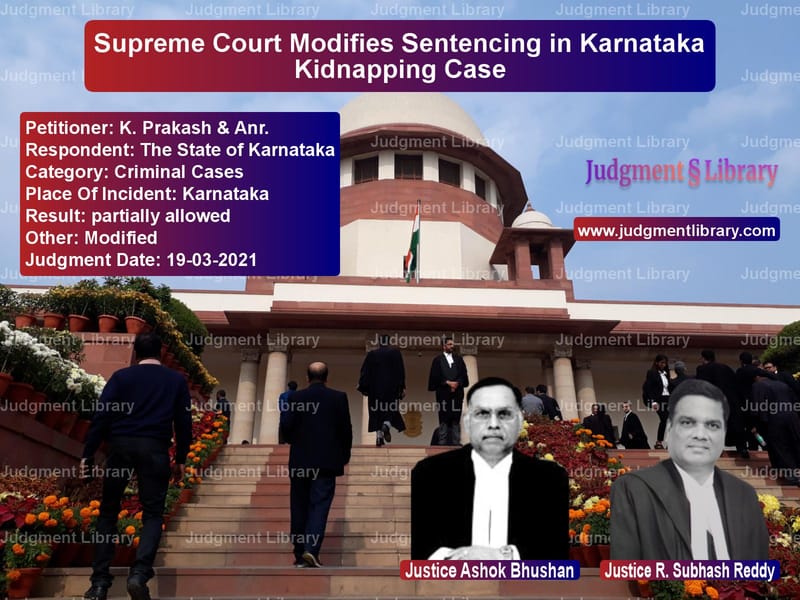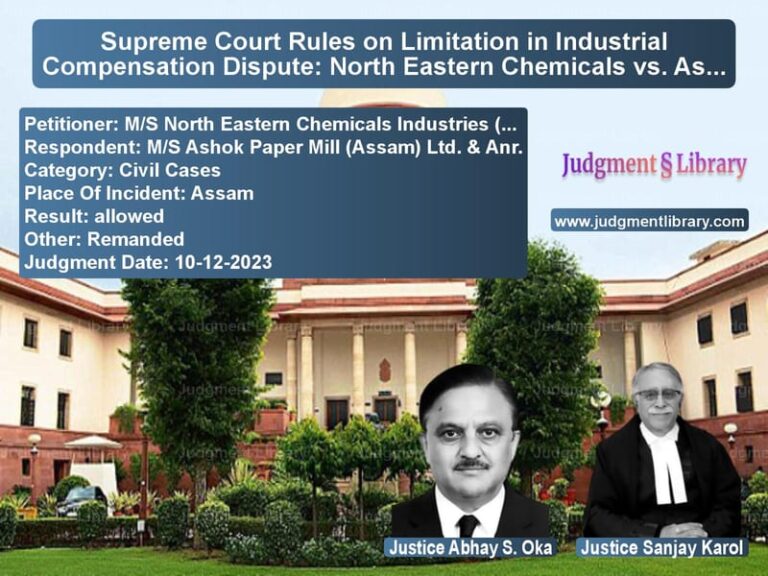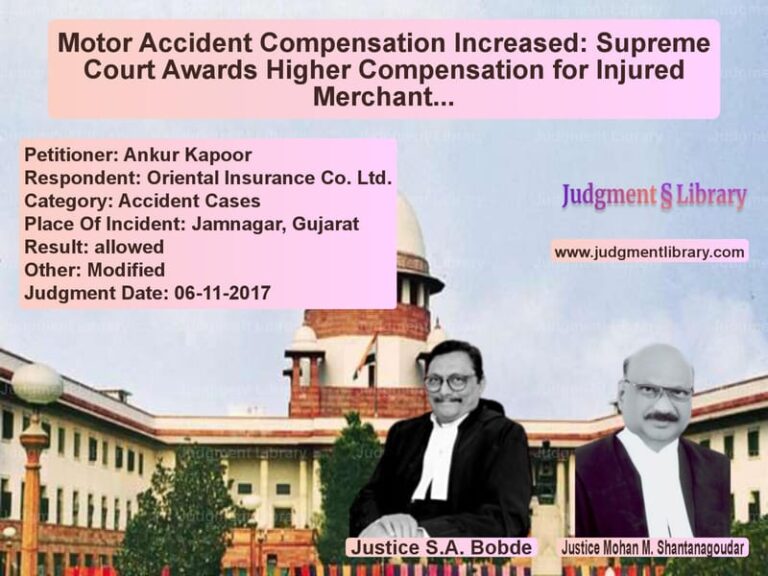Supreme Court Modifies Sentencing in Karnataka Kidnapping Case
The case of K. Prakash & Anr. vs. The State of Karnataka revolves around a complex legal battle concerning the conviction and sentencing of two individuals involved in a kidnapping case. The Supreme Court was tasked with determining whether the punishment imposed on the appellants was proportionate to their alleged role in the crime. The judgment explores key legal principles surrounding sentencing, proportionality, and the role of mitigating circumstances in criminal law.
Background of the Case
The case originated from an incident on May 8, 2014, when a minor girl was allegedly kidnapped while she was on her way to a local shop. Her mother, acting as the complainant, filed a police report stating that her daughter had left to buy milk and chips but did not return. Upon investigation, it was revealed that the minor had left in an auto-rickshaw, allegedly under the influence of the accused individuals, including the appellants.
One of the key accused, identified as accused No.1, had reportedly proposed marriage to the minor girl earlier, despite her being underage. The complainant mother had objected to this proposal. However, on the day of the incident, accused No.1, along with the appellants and other accomplices, allegedly orchestrated the victim’s abduction.
The prosecution argued that the appellants—accused Nos. 4 and 5—actively participated in the crime by providing transportation and facilitating the movement of the kidnapped girl. They were subsequently charged under Sections 344 and 366 of the Indian Penal Code (IPC) for wrongful confinement and kidnapping with intent to compel marriage.
Trial Court Judgment
After a detailed trial, the Sessions Court convicted accused No.1 under Sections 344 and 366 IPC, as well as under Section 6 of the Protection of Children from Sexual Offences (POCSO) Act. The court imposed the following sentences on the appellants:
- One year of simple imprisonment for wrongful confinement under Section 344 IPC, along with a fine of Rs. 2,000.
- Two years of simple imprisonment for kidnapping under Section 366 IPC, along with a fine of Rs. 5,000.
The appellants challenged their conviction and sentence before the Karnataka High Court, which dismissed their appeal and upheld the trial court’s ruling.
Arguments Before the Supreme Court
Petitioners’ (Appellants) Arguments
The appellants, accused Nos. 4 and 5, filed an appeal before the Supreme Court, raising the following contentions:
- The prosecution failed to prove their active participation beyond a reasonable doubt.
- Their role was limited to providing a vehicle, and they did not play a direct role in the kidnapping.
- The quantum of punishment was disproportionate to their level of involvement.
- The trial court failed to consider mitigating factors, including their family responsibilities.
- They had already served approximately three months in custody.
Respondent’s (State of Karnataka) Arguments
The State of Karnataka, representing the prosecution, opposed the appeal and argued:
- The appellants knowingly assisted in the kidnapping by providing logistical support.
- Their role in the conspiracy was established through witness testimonies.
- The High Court rightly upheld the lower court’s judgment.
- Given the gravity of the offense, the punishment was justified and should not be reduced.
Supreme Court’s Analysis
1. Legality of Conviction
The Supreme Court examined whether the appellants’ conviction was legally sound. The Court ruled that the prosecution had established their complicity in aiding the kidnapping. The judgment emphasized:
- “The appellants provided logistical support by offering their vehicle, which enabled the prime accused to move the kidnapped girl to a different location.”
- “Their actions facilitated the crime, making them liable under Sections 344 and 366 IPC.”
2. Sentencing and Proportionality
While upholding the conviction, the Supreme Court took a nuanced approach to sentencing. The Court acknowledged that while the appellants participated in the crime, their role was secondary compared to accused No.1. It noted:
- “Many factors which may not be relevant to determine guilt must be seen with a human approach at the stage of sentencing.”
- “The punishment imposed must be proportionate to the role played by each accused.”
- “A balance must be struck between deterring crime and ensuring fairness to the accused.”
3. Mitigating Circumstances
The Supreme Court also took into account certain mitigating factors:
- The appellants had minor children and elderly parents dependent on them.
- The crime took place in 2014, and the appellants had maintained good conduct during the trial.
- They had already served a substantial portion of their sentence.
Final Judgment
After considering all aspects, the Supreme Court ruled:
- The conviction under Sections 344 and 366 IPC was upheld.
- The sentence of simple imprisonment for one year under Section 344 IPC and two years under Section 366 IPC was modified to “period already undergone.”
- The appellants were ordered to be released immediately, provided they were not required in any other case.
Implications of the Judgment
This ruling carries significant legal implications:
- It reinforces the principle of proportionality in sentencing, ensuring that punishment aligns with the severity of the offense.
- It highlights the importance of considering mitigating factors when determining sentences.
- It affirms the appellate court’s power to modify sentencing while upholding the conviction.
- It serves as a precedent for reviewing sentences in cases where multiple accused play varying roles in a crime.
The Supreme Court’s decision ensures that justice is served while maintaining fairness in sentencing.
Petitioner Name: K. Prakash & Anr..Respondent Name: The State of Karnataka.Judgment By: Justice Ashok Bhushan, Justice R. Subhash Reddy.Place Of Incident: Karnataka.Judgment Date: 19-03-2021.
Don’t miss out on the full details! Download the complete judgment in PDF format below and gain valuable insights instantly!
Download Judgment: k.-prakash-&-anr.-vs-the-state-of-karnata-supreme-court-of-india-judgment-dated-19-03-2021.pdf
Directly Download Judgment: Directly download this Judgment
See all petitions in Bail and Anticipatory Bail
See all petitions in Juvenile Justice
See all petitions in Judgment by Ashok Bhushan
See all petitions in Judgment by R. Subhash Reddy
See all petitions in partially allowed
See all petitions in Modified
See all petitions in supreme court of India judgments March 2021
See all petitions in 2021 judgments
See all posts in Criminal Cases Category
See all allowed petitions in Criminal Cases Category
See all Dismissed petitions in Criminal Cases Category
See all partially allowed petitions in Criminal Cases Category







